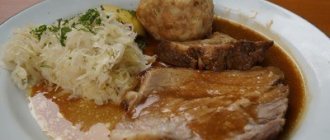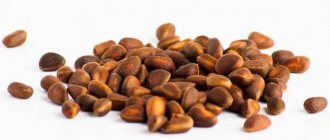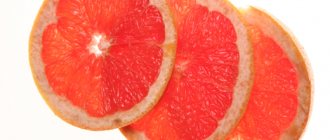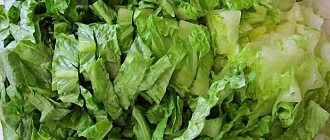One of the main rules of losing weight is: you cannot ignore the feeling of hunger! If the body requires saturation, you need to peacefully meet it halfway. And it is very important to know what and in what quantities you can eat during the most insidious and annoying hunger - the one that comes closer to the night. Many people at this point are misled by the common misconception that fruits are a low-calorie food. In fact, not all of them are appropriate in the diet menu, especially in the evening. Let's talk about what fruits you can eat on a diet.
You often hear the opinion that you can’t eat sweet fruits on a diet, but you can’t eat unsweetened fruits to your heart’s content. This is a fundamentally wrong approach to the issue. Each of them has special characteristic qualities, specific compatibility, and each has its own special, individual set of contraindications. It is on the basis of all this that a conclusion is drawn whether it is possible to include one or another of them in the menu when losing weight in general and in the evening diet in particular.
Apples
Perhaps there are as many opposing opinions among nutritionists about any other fruit as there are about an apple, especially when it comes to dinner or a snack before bed. And each of them is backed by scientific evidence. In fact, there are no contradictions here: apples have both their undeniable advantages and obvious disadvantages. The advisability of including this fruit in the evening menu will depend on which of its properties to take into account and which to ignore. Ultimately, this is determined by the goals set. Let us briefly list the arguments against including apples in the evening menu.
- They contain a lot of fructose. These are carbohydrates that provide energy, the excess of which is converted into fat.
- The carbohydrates present in apples are quickly absorbed and cannot be stored for later.
- They quickly leave the intestines and give a diuretic effect, which is not conducive to restful sleep.
- Apples stimulate the secretion of gastric juice (especially sour varieties, so recommended by many diets) and act as an irritant on the walls of the stomach.
As for the pros, they are well known. Apples are low in calories, but high in pectin, which helps cleanse the intestines and remove everything unnecessary from it.
What fruits can you eat for dinner besides grapes?
Lately I’ve been reading a lot about the fact that fruits contain monosaccharides and therefore should be consumed before lunch. it’s a pity (:blush2: and I so love having cottage cheese with fruit for dinner.... I’ll have to buy grapefruits. Maybe some more? Well, besides lemons) I found something):
Which berries and fruits contain less sugar?
Strawberries. Strawberries are very popular and many people love them. Although it is not a fruit, it would be useful to talk about it. The berries contain a small amount of natural sucrose, fructose. A cup of fresh berries contains 7 to 8 grams of the sweet substance, while frozen berries contain 10 grams.
Lemons. Also referred to as fruits with a low sucrose content. 1 medium-sized lemon contains 1.5 g - 2 g of sweet substance. In addition, the fruits are rich in vitamin C.
Cranberry. The content of sweet substance in cranberries is quite low. One glass of fresh berries contains only about 4 g. However, dried berries are already quite high in calories. The sugar content in 1 cup of dried cranberries is about 72 g.
Papaya. Fruits with low sucrose content. An average cup of papaya pieces contains only 8 grams. The same cup of pureed papaya contains 14 grams of the sweet substance. In addition, the fruits are rich in vitamins C and A, as well as potassium and carotene.
Apples (green varieties), blueberries and blackberries, and apricots also contain the least amount of natural sugar. You can eat black currants, green gooseberries, peaches, melon, watermelon and grapefruit. Such products also include plums, raspberries, pears and tangerines.
Which fruits have a lot of sucrose?
Bananas. One ripe fruit contains 12 g of sugar, as well as 5 g of starch. Bananas should be consumed no more than 3-4 fruits per day, used to make sweet purees, desserts, and used to make cocktails.
Figs 100 g of figs contain about 16 g of sweet substances. And in dried fruits it is even higher. Therefore, be careful with him.
Grape. Berries have a large amount of fructose and glucose. The sweet substance content in one glass of grapes is 29 g. In addition, grapes are rich in potassium. It contains vitamins A and C.
Mango. A very high-calorie product. One ripe fruit contains 35 g of natural sugar. But papaya fruits are very beneficial for humans. They are rich in vitamins A, C, E and K. They contain niacin, beta-carotene, potassium, phosphorus and dietary fiber.
Cherry, sweet cherry. Ripe cherries are also high in calories. One cup of berries contains 18-29 g of sweet substance. But sour cherries can have 9-12 grams of sugar in a small cup.
A pineapple. The natural sugar content of pineapple is quite high at 16 grams per cup. But you don’t need to give it up, just eat in moderation and don’t get carried away. These juicy fruits provide a person with vitamin C, potassium, natural fiber and other substances that are very valuable for health.
When is it better to eat fruit, before or after meals?
If you eat sweet fruits before your main meal, your body will receive a large amount of fast carbohydrates, minerals, salts, vitamins, acids and other useful substances. The body is saturated with water and fiber, which activates the intestines, causing it to work better. There is a natural process of cleansing the body of food debris, waste, and toxins.
Eating fruit after the main meal will restore the natural balance of glucose in the body. The liquid received with fruits reimburses the body for energy costs and promotes the digestion of food.
here's another:
The question that occupies every woman is “What should I eat to lose weight?” And, of course, first of all the eye stops at exotic fruits. Now you will be amazed: scientists give a positive answer to the question, “Do kiwis make you lose weight?” Let's take a closer look at this point.
Kiwi, although included in our assortment for such a long time, has gained steady popularity. And not only here, but also in Europe. It ranks second there (after pineapple) in the ranking of nutritionists. It is currently believed that from a nutritional point of view, kiwi is ideally balanced in nutrients with a minimum of calories. Actinidin, contained in kiwi, helps the body absorb proteins. The enzymes contained in kiwi accelerate fat burning and promote the formation of collagen. And kiwi has a lot of fiber, magnesium, pectin, and also vitamins A, B1, B2, B6, B12 and PP. Well, it tastes wonderful.
Is there a direct connection between the amount of kiwi eaten and the weight lost? Unfortunately no. Just if you really want to lose weight, eat a few kiwi fruits. A diet of 1 kg of kiwi per day will provide you with the elements necessary for life. And at the same time, you will not consume many calories, since kiwi contains less sugar than most fruits. However, you shouldn’t do this every day, since one kiwi fruit contains 1-1.5 an adult’s daily requirement of vitamin C.
I hope you found this information useful. After all, knowing which fruits contain less sugar, you can track how much of it you consumed during the day. This will make it easier for you to regulate its content in your daily diet. Be healthy!
Citrus
Of all the fruits, citrus fruits contain the fewest calories and the most vitamins; they help relieve fatigue and taste great. Orange can be eaten at night for those who have minor heart problems or high cholesterol, and grapefruit will help people suffering from insomnia. However, citrus fruits have serious contraindications, primarily related to gastric disorders. Gastritis, ulcers, irritable bowels and other gastrointestinal problems do not allow the consumption of these fruits in the evening. And in serious cases - in general.
Eating after six o'clock is absolutely necessary
Until recently, all women's magazines, nutritionists and even some doctors frightened women with the fact that calories turn into folds of fat if consumed after the mystical 6 pm. However, there are undeniable arguments that destroy this theory and prove the opposite:
- if the brain receives a hunger signal from the stomach and does not receive a “lights out” within 20 minutes, then the self-preservation instinct turns on - instead of using up calorie reserves, it begins to save them;
- if the stomach works empty at night, then in the literal sense, it does not give rest to the brain, constantly asking to “feed it”, which results in insomnia, irritation and a night run to the refrigerator;
- for those who are used to working at night (writers, scientists, etc.) and falling asleep after midnight, the evening dinner for weight loss should start 2.5-3 hours before going to bed, and at 6 pm, otherwise, the entire eating rhythm will be disrupted.
Good to know : The feeling of fullness occurs after 21 minutes of eating, which is why nutritionists advise filling your stomach with a glass of water half an hour before eating.
We pay attention to serving
Properly “preparing” fruit for consumption is important not only from an aesthetic point of view. Peel the skin if necessary, cut the flesh into small slices, serve on a plate, and then take one at a time and chew each piece thoroughly, getting maximum pleasure - all this contributes to proper digestion and faster satiety.
A few secrets for nightly “rippers” of refrigerators
Crispy vegetables help curb hunger
No matter how low-calorie delicious dishes replace the usual dinner, the risk of a short run to the refrigerator and back at night is still high. These secrets will help level it out:
- Psychologists have proven that food tastes much better to the brain if it is crunchy. It is this gentle crackling in the mouth that gives a feeling of happiness (the secret to the success of chips), but you can achieve it by gnawing on carrots, cucumber or celery;
- if you are not allergic to dark chocolate and honey, then before going to bed you can give yourself the hormone of “happiness” - serotonin, it will help you fall asleep soundly until the morning;
- a feeling of fullness can also appear from a cup of green tea or just a glass of still water; this fact can be used at the moment when your legs stubbornly strive towards the kitchen.
As it turns out, if you know what to eat in the evening to lose weight, you can literally lose weight in your sleep. While a happy brain shows colorful images of distant countries, protein continues to be broken down, maintaining a feeling of fullness, and thanks to negative-calorie vegetables, fat is burned.
Rule of the golden mean
When consuming any product, even the most healthy and harmless for your figure, moderation is needed. Excessiveness, even in the case of fruits, leads to negative consequences. Therefore, it is important to remember that a fruit snack does not mean eating kilograms of apples or oranges.
And one more detail. When choosing fruits for a snack, attention is often paid to their vitamin content. It would seem that the more there are, the better. Not when choosing foods for an evening snack while losing weight! In this case, the amount of vitamins is not at all so important - the calorie content is much more important. And since it is precisely this that gives a feeling of fullness, it is necessary to be able to find that golden mean between hunger and consuming extra calories.
Protein food
Is it possible to eat pasta while losing weight?
Protein is the builder of cells, and the general physical condition of a person depends on how strong the cells are. In losing weight, protein plays almost a key role, thanks to another quality: it breaks down for a long time, “postponing” the appearance of a debilitating feeling of hunger.
Healthy protein foods that can be eaten at night include chicken fillet, fish fillet, turkey meat, egg white, kefir, low-fat yogurt, and some types of cheese. But there will be no benefit from eating protein at night if you don’t devote at least 10-15 minutes to training in the evening.
Reviews and results of losing weight
The dinner minus diet is gaining popularity. This is explained by the absence of strict restrictions and the ability to independently make changes to the menu. However, reviews on the topic of whether you can lose weight if you don’t eat dinner vary. Three groups can be distinguished: positive, negative and neutral.
Positive
Most people who are losing weight note a lot of positive aspects of the nutritional system developed by American nutritionists. First, the ease of following the recommendations. According to reviews, losing weight without dinner is quite easy. The habit develops within a week. Subsequently, you don’t even have to think about food in the evening hours. Thanks to this, sleep improves and there is no heaviness in the stomach.
By being able to consume your favorite treats in the morning, you are in a good mood for the whole day. There is no desire to break loose after lunch. The body is full of strength and energy.
Gradual but guaranteed weight loss gives optimism. According to reviews, there is a desire to continue the diet without dinner. Over time, you develop the habit of eating right, which has a positive effect not only on your figure, but also on your overall well-being. Healthy eating is becoming the norm.
After a month of following the recommendations, I want to move on. Additional strength appears for sports. In the evening, time is freed up for your favorite hobby, walking in the fresh air. Complete internal harmony arises, since there is no reason to blame yourself for eating a piece of sausage or cake at night.
Negative
Some people who lose weight remain dissatisfied with their diet. They can be roughly divided into two groups. Some leave negative reviews because giving up dinner to lose weight is simply unacceptable in their case. They can't sleep. Feel an irritating rumbling in the stomach. As a result, you have to get up and cook food. Perhaps this is due to the specific structure of a particular organism or to a lack of willpower. Experts also focus on the wrong psychological attitude. It’s not for nothing that they say that the forbidden fruit is sweet.
Others are unhappy with the speed of their weight loss. The kilograms are coming off slowly. The lack of a significant result becomes a reason for negative reviews about the diet minus dinner and refusal to follow the recommendations. Other types of diets are chosen, with which you can lose up to 10 kg in a week. However, according to nutritionists, severe stress during weight loss contributes to the rapid return of the original weight. Sharp jumps up and down can have a negative impact on health in the future.
Advantages and disadvantages
Each developed nutrition system for weight loss has both advantages and disadvantages. The dinner minus diet is no exception. The advantages include:
- lack of hunger. At first, you may feel a desire to eat something in the evening. But gradually the body will rebuild itself and will not lack food;
- the opportunity to treat yourself to your favorite dish. There are no specific prohibitions; there are recommendations. Therefore, as soon as you want to eat a treat, you can do it with a clear conscience. The main thing is in the first half of the day and a small portion;
- minimal number of contraindications;
- health safety. Thanks to the gentle regime, there is no stress for the body. Sleep is normalized and a rejuvenation effect is noted. In addition, a varied menu contributes to the supply of the required amount of nutrients;
- the ability to follow a diet minus dinner anywhere and at any time of the year. Does not require preparation of special dishes. The absence of a ban on alcohol allows you to adhere to your diet and diet even on vacation;
- Gradually getting rid of extra pounds allows you to maintain the achieved result for a long time;
- a unique opportunity to switch to a proper nutrition system forever. During the days of following a diet that involves giving up dinner, the body is reorganized into a loyal mode. Unhealthy foods are gradually no longer attractive.
One of the shortcomings can be highlighted. This is the impossibility of rapid weight loss. If you want to correct your figure as soon as possible, a diet without dinner is not acceptable.
Disadvantages of evening fasting
If you are not used to eating in the morning, then a complete refusal to eat can result in gastrointestinal diseases. Completely eliminating food after 18 hours is possible only with a strict diet. Fractional meals are distributed until 6 pm at intervals of 2-3 hours. Then you can drink purified water. Contraindications to evening fasting are:
- anorexia, exhaustion;
- depression;
- thyroid dysfunction;
- pregnancy, lactation;
- liver failure, kidney failure.
This weight loss technique is not suitable for diabetics. If you increase the intervals between meals, this will lead to a sharp decrease in glucose. This diet is also not suitable for patients who are prone to constipation.
Girls who lead an active lifestyle and train almost every day should not completely give up dinner. Since intense exercise depletes glycogen levels, the liver may suffer. If the supply is not replenished, there is a danger of fatty hepatosis (liver disease). You can learn about the features of a diet for weight loss and understand whether you should eat after six by watching the video:
Contraindications
A diet minus dinner is a kind of example of proper, balanced nutrition. Therefore, the list of contraindications is insignificant. Includes the following items:
- It is undesirable to change your usual routine and diet during pregnancy;
- nursing mothers should adhere to a diet developed by a doctor according to specific health indicators of the woman and child;
- teenagers and elderly people. There are no clear prohibitions on following the diet. However, it is recommended to consult your doctor first. Perhaps refusing dinner due to age will have a negative impact on the body;
- diseases of the digestive system, liver, nervous and cardiovascular systems dictate different conditions. A light dinner is recommended;
- increased physical and mental stress in the evening is impossible without a full dinner. Otherwise, the body will weaken very quickly.
Since contraindications are relative, with the exception of serious illnesses, the diet can be adjusted. For example, a glass of kefir in the evening will satisfy your hunger. If this does not help, then this nutrition option should be abandoned.
Fermented milk products without additives
Unsweetened fermented milk products like kefir, Greek yogurt, fermented baked milk or yogurt without any additives are also an excellent choice for an evening meal. 100 g of such a snack contains only 50-70 kcal - of course, we are not talking about high-fat foods.
This is an excellent source of protein, which easily satisfies hunger without causing heaviness in the stomach, and beneficial calcium, necessary for bone health. Fermented milk products also have a beneficial effect on the microflora of the gastrointestinal tract, promote accelerated processing of other food, reduce acidity and have calming properties, which is perfect before bed.
Basic principles
The underlying principle is in the name itself. Dinner should be excluded from your diet. Since everyone has their own rhythm and schedule of life, there is no clear time for the last meal. The main rule is to eat no later than 5 hours before bedtime. Restrictions do not apply to drinks. In the evening, you can drink unsweetened juices prepared at home without dyes or preservatives.
Nutritionists recommend giving up unhealthy foods, however, if an irresistible desire arises, you can indulge in limited quantities. In this case, the most high-calorie dishes should be consumed in the morning, gradually reducing the level in the evening. This principle helps fill the body with energy for the whole day, and before bed allows you to avoid breakdowns.
Drinking pure still water throughout the day deserves special attention. The required amount is 1.5–2 liters per day. In addition to quenching thirst, water can cope with hunger. One glass fills the stomach, which sends a signal to the brain. As a result, the desire to eat anything disappears.
The psychological attitude is also important. Setting unattainable goals for yourself is unacceptable. A no-dinner diet promotes slow but productive weight loss. Therefore, it is necessary to clearly understand that the kilograms will go away gradually. This requires patience.
The effectiveness of the diet minus dinner can be increased through additional physical activity. Visiting fitness clubs and walking in the fresh air have a beneficial effect on creating an ideal figure. At the same time, nutritionists point out that it is advisable to carry out training in the first half of the day, since increasing the load in the evening contributes to the feeling of hunger.
Cottage cheese, cheese
This is one of the most successful dinner options for those who are wondering what to eat in the evening while losing weight. It is useful because 100 g of product contains at least 12 g of protein. But at the same time, it contains less fat than even lean meats.
Nutritionists do not recommend cottage cheese with 0% fat content, since lipids are needed for the absorption of calcium and vitamins. Preference should be given to a product containing 1.8-5% fat. In addition, the substance CLA, which prevents obesity, was recently discovered in cottage cheese.
The optimal amount of cottage cheese is 2-3 tablespoons. The best culinary companions for the product will be fresh vegetables, herbs, berries, and bread. But it is best to eat it in its pure form. Additives such as jam and marmalade are especially harmful.
You can also use the product in the form of a casserole. To prepare it take:
- cottage cheese - 200 g;
- semolina - 3 tbsp. l;
- fructose - 1 tsp;
- eggs - 1 pc.;
- a pinch of soda.
The components are mixed. The oven is heated to 180 °C, the curd mass is placed in a mold and baked for 30 minutes.
Brynza and goat's milk cheese are also suitable for the evening.











